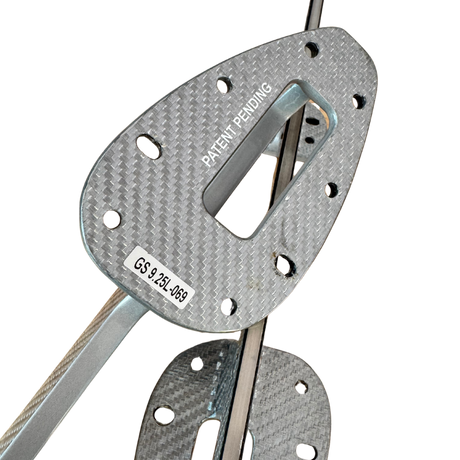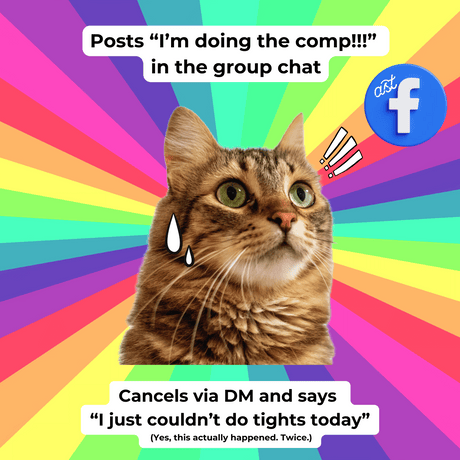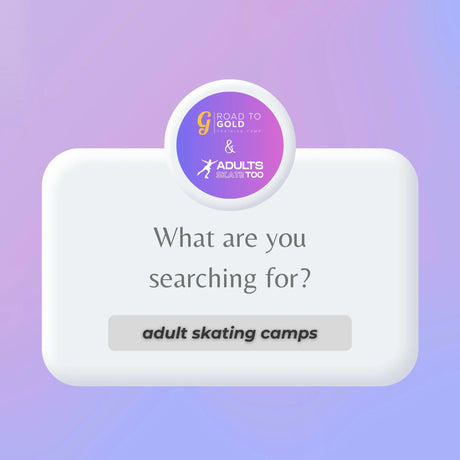Glide Your Way to Wellness: Figure Skating’s Mental Health Boost for Adults
Stepping onto the ice can feel almost magical – the world quiets down as the cool air hits your face, and for a little while it’s just you and the glide. If you’re an adult who’s new to figure skating (or thinking about starting), you might be surprised at how much this sport can do for your mind. Skating isn’t just good for your body; it’s a powerful way to care for your mental well-being, too. In fact, many skaters find the rink to be a sanctuary from daily stresses. As one adult player described, even on a busy day, “as soon as I get to the rink, we’re just laughing and having fun. It’s such a stress reliever.” What is it about ice skating that leaves us feeling so refreshed and uplifted? Let’s take a closer look at five key ways figure skating supports mental health – from stress relief and mindfulness to confidence, creativity, resilience, and even new friendships. Whether you’re lacing up for the first time at 35 or returning to the ice after years away, these insights will inspire you to embrace skating as a happy place for both body and mind.
Stress Relief and Mindfulness on Ice
Life is stressful – work, bills, responsibilities – and our minds often race a mile a minute. Stepping onto the ice offers a much-needed pause. Skating has a way of bringing you into the present moment, helping you focus on here and now instead of yesterday’s worries or tomorrow’s to-do list. The reason is simple: if you let your mind wander when you’re skating, you’ll probably wobble or even take a tumble! The intense focus required to stay upright and glide keeps your thoughts fully engaged. In this sense, a skating session becomes a form of moving meditation. You concentrate on your edges, your balance, the rhythm of your skates on the ice – and as you do, the chatter in your head quiets down.
Skaters often describe this as incredibly calming. One skater-turned-writer noted that after an hour on the ice she “left with a hefty dose of mental clarity” and felt “seriously de-stressed,” reveling in an “addictive influx of calm.” Indeed, the act of gliding and the rhythm of movement can be soothing for the soul. Unlike sitting still trying to meditate (which isn’t for everyone), skating naturally forces you to focus on your body’s motions. The result? You inadvertently practice mindfulness – you give your mind a break from anxious thoughts because you’re busy feeling your skate blade trace the ice. Mental health professionals increasingly recognize the power of such activities; even surfing and similar sports are being used as therapeutic tools for PTSD and depression, precisely because they help individuals stay in the moment and find relief from mental turmoil. Figure skating offers that same mindful escape. By the time you step off the ice, you may find that whatever was bothering you before has loosened its grip. Your mind feels clearer and lighter – all thanks to an hour of active focus and fun on the ice.
Physical Activity and Endorphin Release
Lacing up your skates isn’t just fun – it triggers feel-good chemistry in your brain. When you get moving on the ice, your body is hard at work, and that exercise pays off in mood-boosting benefits. Physical activity of any kind causes our brains to release a cocktail of happy chemicals: dopamine, serotonin, endorphins, and even endocannabinoids – all of which play a role in improving mood and reducing stress. Endorphins in particular are famous for creating that post-exercise euphoria known as a “runner’s high.” (On the ice, let’s call it a “skater’s high”!) These natural hormones act as pain relievers and stress fighters, making you feel more relaxed and positive. It’s no wonder experts often say exercise is one of the best prescriptions for anxiety or depression.
Figure skating definitely counts as exercise – and then some. It gets your heart pumping and engages just about every muscle group (legs, core, even your arms for balance). But unlike dragging yourself to a treadmill, skating feels like play. You’re having fun, maybe spinning to music or chasing friends around during a public session, and you barely notice you’re working out. Meanwhile, your body is flooded with endorphins that lift your spirits. “Skating releases endorphins, known as the ‘feel-good’ hormones, helping to boost mood – you’re sure to leave feeling uplifted at the end of your skate session!” notes one skating center. Many adult skaters will attest that they can come to the rink feeling grumpy or tired but leave with a big smile. That rush of energy, pride and pure joy after a great skate? That’s endorphins at work – your body’s way of saying “Hey, you did something amazing for yourself!” Even better, skating’s mood boost doesn’t come with the sense of drudgery that sometimes accompanies gym workouts. It “lifts your mood in a way that doesn’t feel like a workout. Instead, it feels like freedom.” So, as you glide faster or finally conquer that new skill, know that you’re not just having fun – you’re literally nourishing your brain with chemicals that beat stress, reduce pain, and make you happier. Over time, regular skating can even help reduce symptoms of anxiety and depression, thanks to this natural chemical high and the confidence that comes with getting stronger. In short, a skating habit is a healthy addiction for your brain, one that leaves you feeling invigorated and emotionally balanced.
Creative Expression and Emotional Processing
Figure skating isn’t only sport – it’s art on ice. This means it gives you a special outlet to express yourself and process emotions in a creative way. Many adult skaters discover that skating lets them tap into feelings that might be hard to put into words. Are you stressed or sad? Try pouring it into a sweeping, expressive skate to your favorite music. Feeling joyful or playful? Let that show in a fun footwork sequence or a goofy little dance on ice. In figure skating, you’re free to embody any emotion and tell a story with your movements. As one skating enthusiast put it, figure skating is a unique blend of sport and art, allowing you to express emotions through movement. From the music you choose to the choreography you create, “skaters create personal artistic stories on the ice,” which nurtures both creativity and emotional expression. You don’t have to be performing for an audience or doing double Axels to get this benefit; even in a practice session or an adult coffee club skate, you can lose yourself in the feeling of the music and motion.
This creative aspect of skating is more powerful than you might think. Psychologists often talk about the benefits of creative hobbies – whether it’s painting, writing, or dance – for processing emotions and relieving stress. Figure skating checks all those boxes: it’s physical and creative. You can literally skate through your feelings. Perhaps that’s why so many people find skating cathartic. It’s like a form of dance therapy on ice. One adult skater described it beautifully: skating is “art, music, and emotion all wrapped into one… like writing a story with your blades – one that’s uniquely yours.” And, she adds, “that kind of creativity is healing. It’s a way to let go, feel something, and just be.” On those days when you have pent-up frustration or heartache, the ice can be an incredible place to release it. Some skaters skate out their anger by doing quick, sharp movements; others might find a melancholic song and glide through sadness, coming out the other side feeling lighter. The ice accepts it all. Over time, this practice of channeling your emotions into creative expression can help you understand yourself better and cope with life’s challenges off the ice as well. It’s a moving canvas where you can safely explore feelings. And when you step off, you often find you’ve left some emotional baggage behind on that cold, glittering stage. In its place you carry home a sense of relief, creativity, and self-awareness. Not bad for an evening at the rink, right?
Building Confidence and Resilience
Learning to figure skate as an adult is a bold and brave adventure. At first, it can be intimidating – you’re stepping out of your comfort zone, probably stumbling around a bit, and pushing yourself to learn new skills. But guess what? Every small victory on the ice, from gliding unassisted to mastering a trick, gives you a confidence boost that is priceless. Achieving skating milestones – no matter how humble – proves to you that you can do hard things. One guide to skating benefits notes that each challenge overcome on the ice teaches you that you’re capable and resilient, and this self-belief “spills into other areas of life,” making you feel more empowered in general. It’s so true: today it might be skating backwards; tomorrow you might approach a tough task at work with a new sense of “I got this,” thanks to the grit you’ve been building on the ice.
Perhaps the greatest life lesson skating offers is resilience. Every skater, no matter their age or level, learns how to fall and get back up again. In fact, falling is literally part of the learning process – you fall, you dust off the ice shavings, you smile (or groan), and you try again. Olympic medalist Gracie Gold has pointed out that figure skating is “a literal embodiment of fall down and get back up.” She notes that while there’s a saying “fall down seven, get up eight,” in skating “it’s more like fall down a million, get back up a million and one.” And that’s a tough but valuable lesson at any age. Every tumble you take and recover from on the ice builds your mental muscle of perseverance. You learn not to fear failure as much, because you experience firsthand that failing doesn’t defeat you – it’s just part of the journey to success. As you progress, you start to wear your bruises and skating scuffs like badges of honor, symbols of your determination. Coaches often say progress in skating isn’t linear: there are ups and downs, breakthroughs and setbacks. Adult skaters know this well – one week you nail that new move, the next week you might struggle with it again. But through it all, you’re developing an inner resilience. You come to understand that with patience and practice, you will improve, and that mistakes are not the end of the world. This mindset carries over into daily life. Suddenly a problem at work or a personal setback might not shake you as much, because you’ve trained yourself to keep going. In short, skating helps you internalize the message: you are stronger than you think. With every wobble overcome and every goal reached, you stand a little taller both on the ice and off.
Social Connection in the Skating Community
One of the most delightful surprises for many adult skaters is finding an incredibly warm and welcoming community. We often think of figure skating as an individual sport, but when you start skating regularly you’ll discover you’re not alone out there – far from it! From fellow skaters in your group class or weekly public skate, to coaches and rink staff, to online groups of adult skating enthusiasts, there’s a whole network of people who share your new passion. Joining this community can do wonders for your mental health. Humans are social creatures; laughter and camaraderie with friends (new or old) is some of the best stress relief around. Your local ice rink can become a social hub where you exchange tips, celebrate each other’s progress, and maybe grab a hot chocolate together after skating. It’s an environment that’s supportive by nature – after all, everyone remembers what it was like to be a beginner and everyone knows how it feels to struggle with a skill, so skaters tend to cheer each other on. Even just casually skating and chatting can fulfill that need for connection. A skating rink is “a great place to socialise,” notes one leisure center – ideal for a fun day out with friends or family, or even a creative date night. And if you come alone, no worries: frequent skate sessions are a fantastic way to start meeting new people who love to skate and stay active, just like you.
Beyond just casual fun, many adult skaters find a true support system in the skating community. The adult skating world is famously encouraging and inclusive. Skaters range in age from college students to retirees, all brought together by the joy of skating. As one adult skating organization describes, “The adult skating community is welcoming, supportive, and full of people who just get it.” Whether you’re connecting online in an adult skaters’ forum, attending an adults-only skating clinic, or just chatting and laughing at the rink during a practice, skating tends to bring people together in a genuine, uplifting way. Knowing that your “skating friends” have your back can significantly buffer against life’s stresses. There’s always someone to celebrate your little wins (like finally landing that trick) and to commiserate on the tough days (we all have sessions where nothing goes right!). This sense of belonging and shared purpose can really elevate your mood and self-esteem. Research in psychology consistently shows that social support is linked to better mental health – and that’s exactly what you’ll find in a friendly skating club or class. In fact, the camaraderie and emotional support that grows among skaters might end up being one of the reasons you keep coming back to the ice. It feels good to be part of something, to have tribe that understands why you love this quirky sport. Over time, you might find that some of your best friends are people you met through skating. And even if you’re more of a lone wolf, just having those positive interactions at the rink – the smiles, the encouraging words – can brighten your day. The skating community, in essence, shows us that we’re all in this together, learning and growing side by side.
Gliding Toward a Happier You
By now, it’s clear that figure skating offers far more than just a cool party trick or a way to stay fit. For adults especially, it can be a lifeline for mental wellness – a perfect blend of exercise, mindfulness, creativity, personal growth, and community. It’s pretty amazing that one activity can check all those boxes, but skating does! So if you ever need a break from the noise of everyday life, a boost of joy, or a reminder of what you’re capable of, lace up those skates. Head out onto that smooth expanse of ice and let yourself glide. You might find your stress melting away as quickly as the ice shavings under your blades. You might find yourself smiling ear to ear for no particular reason at all. And you’ll definitely be nurturing your body and mind in the process – building a healthier, happier you with each lap around the rink.
Remember, it doesn’t matter if you’re new or returning, wobbly or graceful. Figure skating meets you where you are. Take it at your own pace, enjoy the journey (and the occasional fall!), and soak up all the good vibes it has to offer. Your mental health will thank you. In the words of one skating blogger, “at the end of the day, skating is about more than just skills and technique. It’s about doing something that makes you feel alive, strong, and free.” Indeed, feeling alive, strong, and free – isn’t that what mental well-being is all about? So here’s to all the adult skaters out there, gliding toward greater happiness one stride at a time. See you on the ice – and in the meantime, take care of yourself both on and off the rink. Keep skating, keep smiling, and keep shining!
Sources: Supporting research, expert insights, and skater experiences were drawn from U.S. Figure Skating articles, sports medicine experts, and personal accounts in the skating community. These illustrate the profound impact of figure skating on mental health and highlight how skating can be a joyful path to stress relief, confidence, creativity, resilience, and social connection.
Enjoy your skating journey and the mental lift that comes with it!





